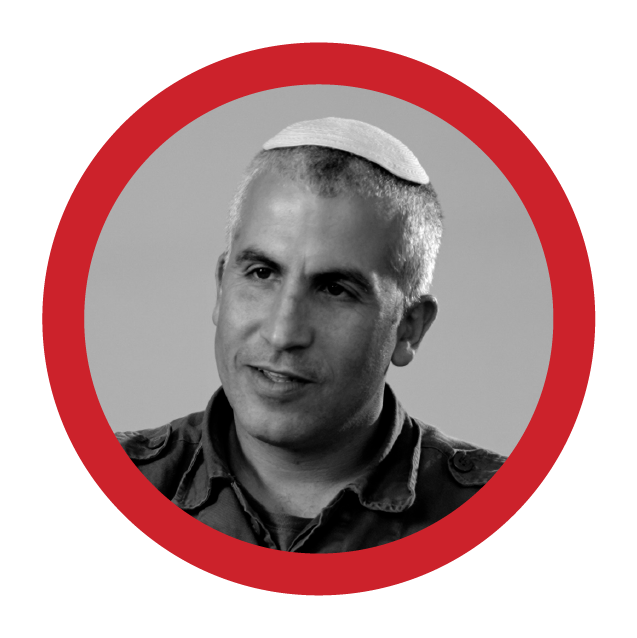

Elhanan Team
Elhanan Kalmanson, Menahem Kalmanson, Itiel Zohar
“After you go through a few houses there, or after you get to a safe room just a few seconds late and see what was left behind there, you realize you’re in a race against time.”
– Menahem Kalmanson
The Elhanan Team had three members: Elhanan Kalmanson, his brother Menachem, and his nephew Itiel. On the afternoon of October 7th, Elhanan and Menachem set out from Otniel. Elhanan was a Mossad operative and had spent Shabbat with his family in Otniel. Menachem was in the village of Retamim. When the rocket fire, explosions and interceptions began, his initial instinct was to stay close to his family. In contrast, Elhanan was called to command the rapid response team that he had established. Menachem was called up to assist.
At 8:20 a.m., Elhanan woke his children and informed them of the situation. His son, Shay, described that morning in Otniel: “He told us that many terrorists had broken through, paragliders, trucks, and they had breached the fence.” Elhanan was agitated, painting a grim picture of what was happening. “This is disaster on a national scale, there will be more casualties than during the Yom Kippur War,” he predicted.
When Menachem arrived in Otniel, he received a thorough briefing from his brother. “There has been a massive infiltration into towns in the area, entire villages have been captured,” he said. He stood watch until 04:00 PM, when Elhanan texted him: “I’m packing and heading south.” After a moment of brief hesitation, Menachem decided to join him. Meanwhile, Elhanan was hearing from friends, including IDF commanders, that their children were trapped in the area and needed rescue.
As they approached the Gaza envelope, a new challenge arose: military roadblocks intended to prevent terrorists from moving northward and civilians from heading south. Utilizing ingenuity, Elhanan managed to deceive the soldiers and convinced them to let them through. At the same time, he was texting with friends from the army and realized that the place where they were most needed was Be’eri.
On the way, they first witnessed the horror: an overturned truck, with the bodies of terrorists nearby, their weapons by their side, RPG launchers scattered on the road, loaded with rockets, ready to fire. The fact that no one had collected the weapons made them realize the intensity of the fighting. By this point, Elhanan understood that there had been a complete collapse.
At the entrance to their destination, Kibbutz Be’eri, they encountered chaos. Dozens of soldiers were idling outside the kibbutz, waiting for instructions. Officers were assigning sectors. Civilians, whose relatives were trapped in houses in the kibbutz, were crying out for help, but the army was still trying to get organized. Near the gate, senior officers were dividing sectors, with many units sent to rescue the kibbutz. Inside the kibbutz, it was war: “light gunfire, heavy gunfire, grenade explosions, RPGs, shell fire, rocket sirens, smoke rising from every house.”
Despite the abundance of forces, Elhanan realized that no one had taken on the mission of rescuing the civilians trapped inside the kibbutz. They went in to rescue a 12-year-old girl, a 90-year-old grandmother, and anyone else they could. Throughout the night, they continued to rescue trapped civilians, even when they were exhausted and terrified of what was to come. The overriding principle they adhered to was that “people should not leave like refugees.” They tried to distract those they rescued from the horrors. They insisted that even in this most terrible of moments, they would leave with their heads held high, not in shame: a woman wearing only a bra and underwear was given a moment of grace to find clothes, or special efforts were made to locate hearing aids and shoes for an elderly woman.
At the last house they reached, they were exhausted. Even the batteries in their flashlights had run out. They took shelter inside a house as daylight broke. Elhanan was the first to enter, opened the door, and shouted, “I’ve been hit!” A burst of gunfire knocked him to the ground. He was pronounced dead at the gate of Be’eri, where he had rescued more than a hundred of the kibbutz’s residents.
